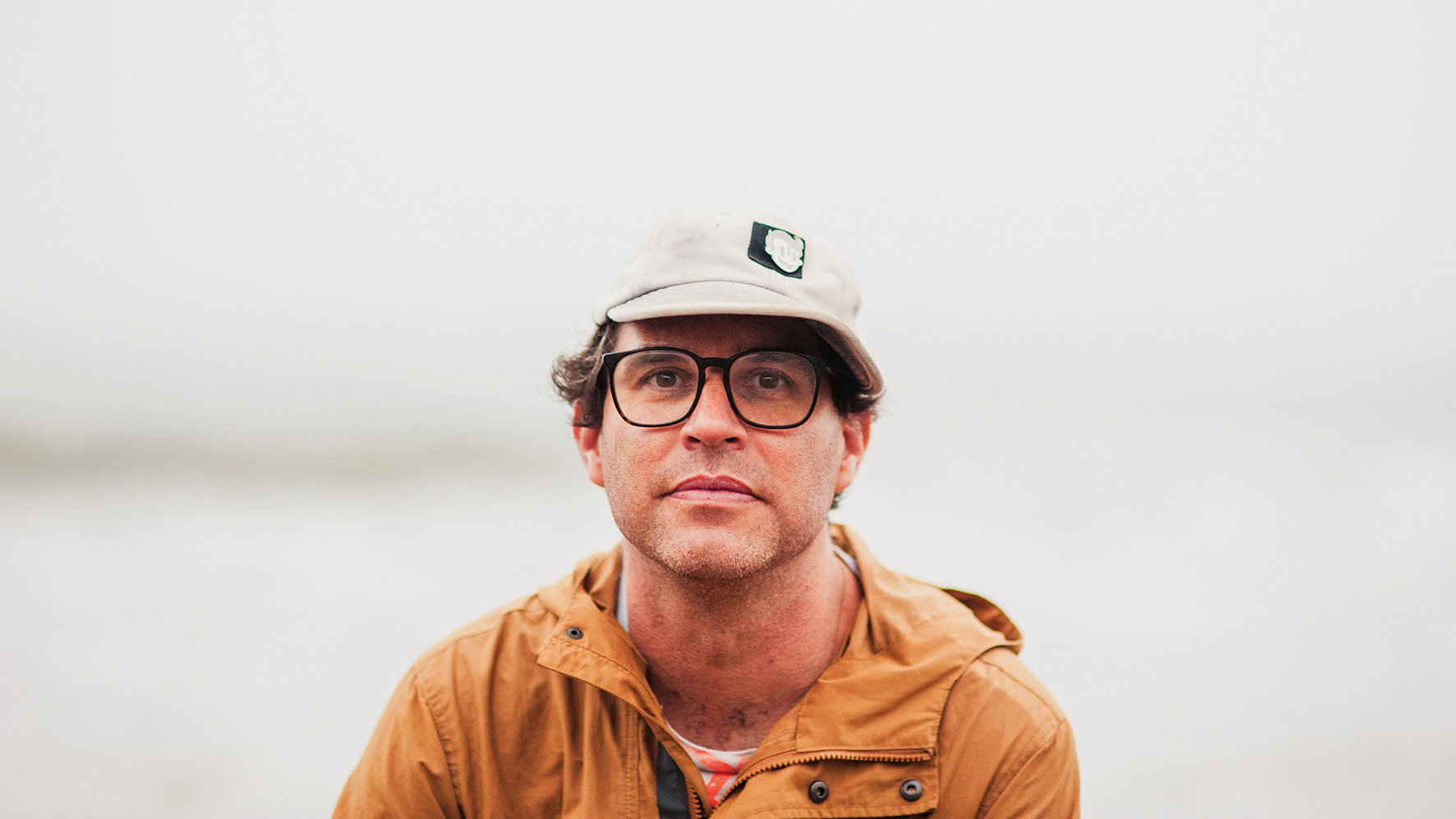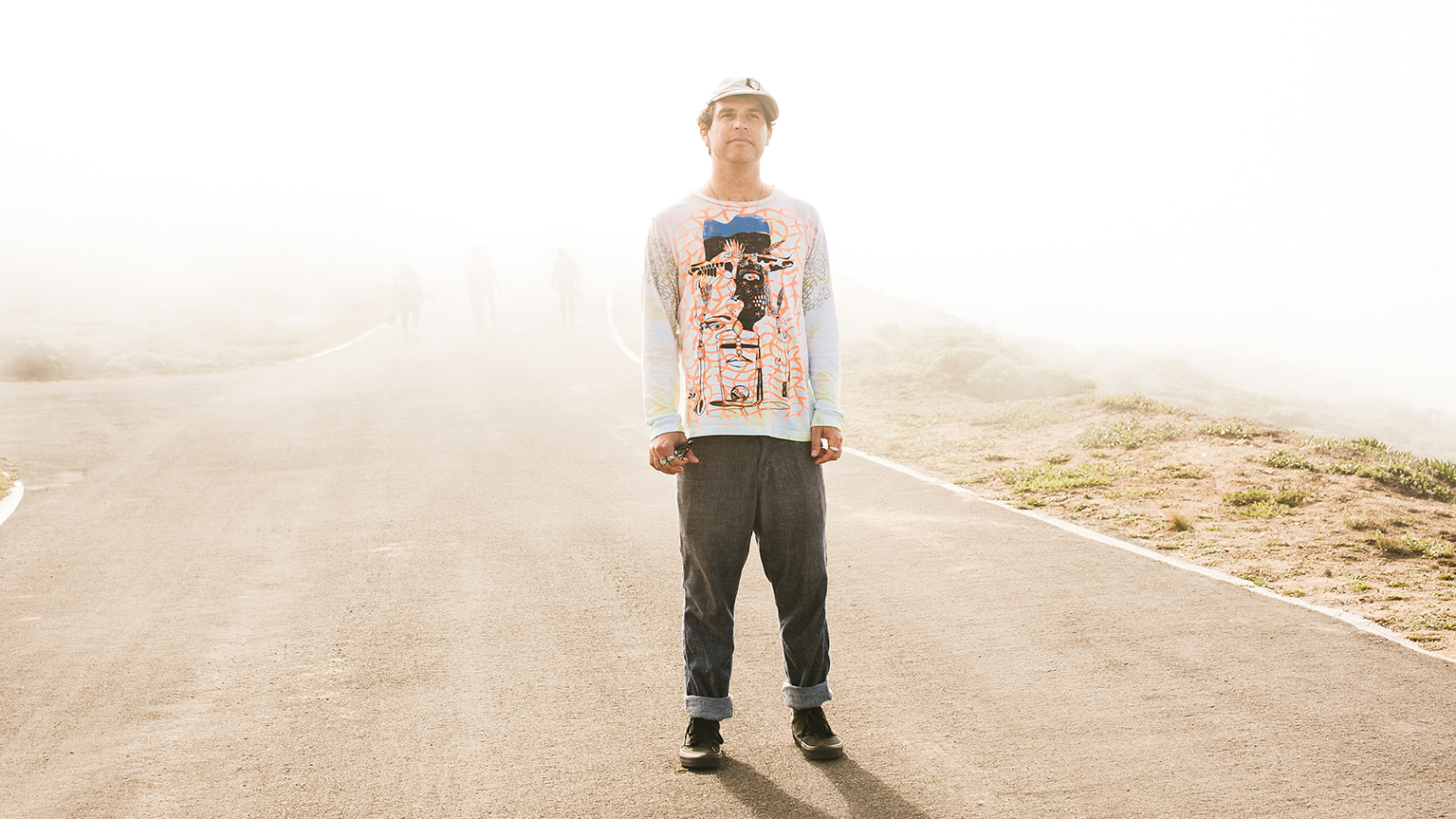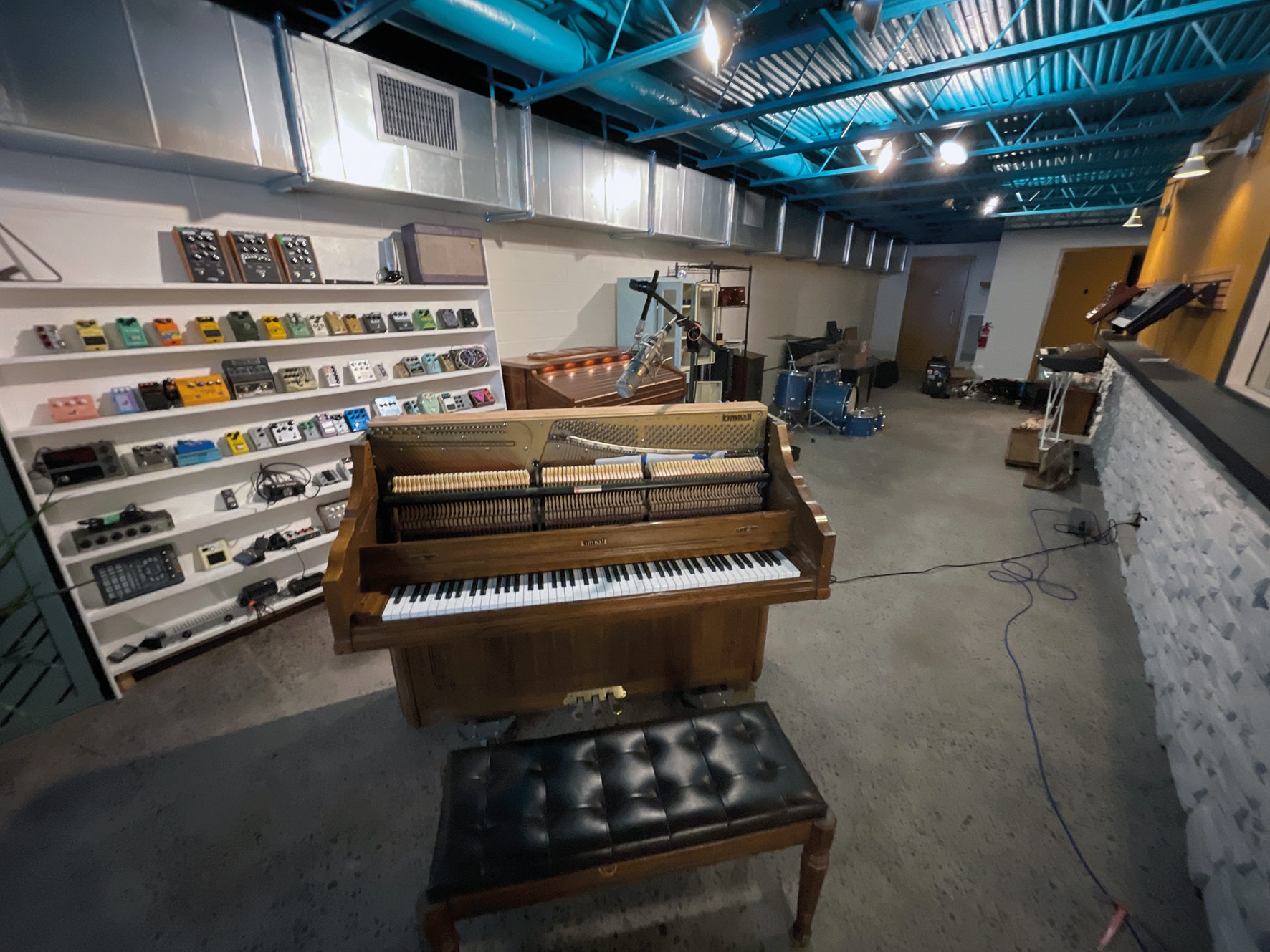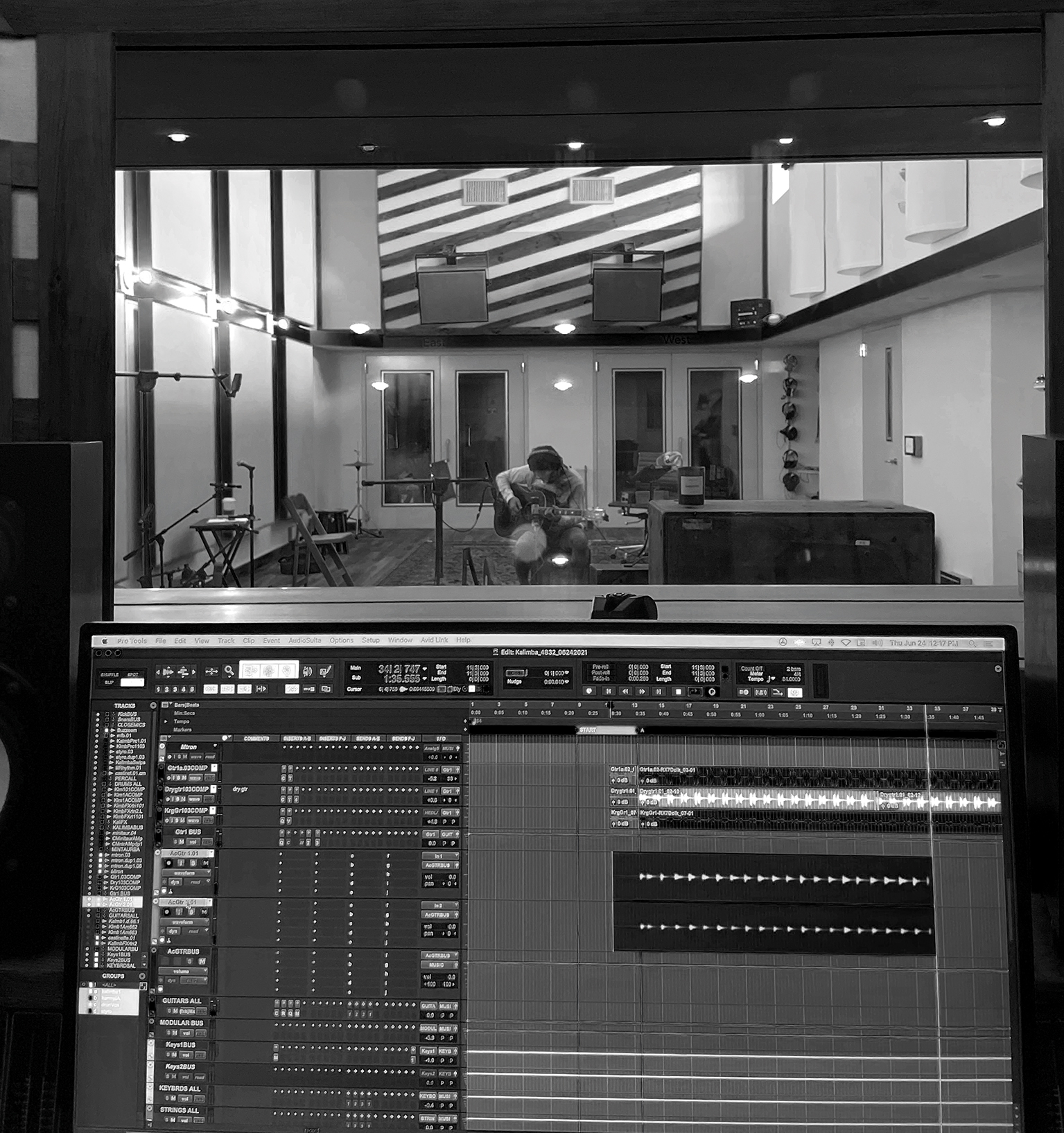Avey Tare: “The Roland Juno-60 is my favourite keyboard of all time”
Perennially leapfrogging between Animal Collective and Avey Tare, Danny Turner asks Dave Portner how he manages to feed both fires

Despite founding the experimental pop band Animal Collective in Y2K and releasing a host of critically acclaimed albums, workaholic songwriter Dave Portner has still found time to collaborate separately with band mate Noah Lennox (Panda Bear), release six solo albums under the pseudonym Avey Tare and drive numerous other projects to completion.
In recent years, Portner has relocated from bustling Los Angeles to woodlands on the eastern edge of Asheville, North Carolina, sequestering himself in his diminutive home studio. However, for his latest Avery Tare album, 7s, he was seduced into working at Adam McDaniel’s Drop of Sun complex in an attempt to further metamorphose his surreal approach.
Over the last two decades, there’s been barely a year when you haven’t released a solo album or an Animal Collective LP. Would you describe yourself as a workaholic?
“I was more of a workaholic when I first started, to the point of being so addicted that I couldn’t wean myself away from making music until the wee hours. As I’ve got older, I’ve tried to find more balance and find that I actually do better work when I’m not pushing myself so hard.
“For the first decade, my goal was to always be working on or releasing something and it worked out well, but over the last decade I’m taking a little longer to make Animal Collective records and giving more space for the solo projects.”
How do you keep the creative fires burning?
“By creating situations that feel good for creativity. Quarantine and the pandemic put a dampener on having the freedom to do what I wanted. I’d been confined to my personal studio space for a couple of years, but it seems like so many more people are utilising personal recording gear and equipment in their home studios these days, which allows musicians to crank stuff out all of the time.
Want all the hottest music and gear news, reviews, deals, features and more, direct to your inbox? Sign up here.
“With Animal Collective, there’s not a lot of pressure for us to all be involved in any given project. The group’s always been based on the strength of four individuals and we’re all needed to make it work – that’s what makes us unique.”
What lies behind the Avey Tare pseudonym?
“It’s a character. Noah did that sort of thing first with Panda Bear, but when we were young we decided that we’d all have individual names. Avey Tare came from being really into this idea of a swamp-like character.
“I’ve always been into horror movie literature – early Arthur Machen, original HP Lovecraft and various Gothic tales that took place in the Deep South. It’s not fully formed, but the name Avey is actually based on my name Davey and Tare relates to tearing my name apart. A lot of people have tried to figure that out.”
Is there a clear delineation in your mind between an Animal Collective and Avey Tare release?
“It’s usually based on the style or maybe the kinds of songs that I write. There are obviously so many more possibilities when working within Animal Collective because writing songs with other people allows things to happen that I couldn’t do alone and we just tend to hash things out together.
“Josh [Dibb] plays melodic lines that I wouldn’t play and Noah’s voice is very distinctive and plays a big part in the sound. With the solo stuff, it goes back to me writing all the parts and coming up with most of the sounds.”

Are we right that you now live in the woods on the edge of the small town of Asheville, North Carolina?
“Before moving here I needed to live in the city to interact and be around people. Cohabitating was very important to me because rural life can be very isolating, but being back in the woods where I grew up feels like a move back to my roots. I was over the struggles of living in the city and a quality of life where you don’t have tons of money.”
How does your new environment affect your creative process and the things you write about?
“This area is beautiful and because there’s not a lot of noise or people there’s so much more head space. It’s great to hike and get away from the studio. 7s is a lot more internal because a lot more time was spent isolated and dwelling on my problems, but there are times when I prefer to look for inspiration outside of that. Seeing different places, people and cultures and being the fly-on-the-wall is very inspiring to me and that flow decides where I’m going to go next.”
You’re not far from Nashville, of course. Have certain aspects of the country scene there had an influence on your career?
“Over the past decade I’ve become a lot more interested in pedal steel guitar as a sound. Having lived in LA for five years, there’s a history of cosmic country music coming out of California, but I’ve definitely been attracted to Nashville. Obviously, it’s different to how it was in country’s heyday, but I always romanticise it. I’ve been into the guitar playing and singing styles of Roscoe Holcomb and, especially, Elizabeth Cotten since I was much younger.”
So what’s your woodland studio setup at present – we’re having visions of an eco-friendly log cabin?
“[Laughs] I would love to live that life and have many friends around here who are moving in that direction, but being a touring musician and requiring the easy comfort of music shops and people who can repair my gear means that it’s not so easy to pull off.
“My studio is based in a small room off from my garage and, whilst I’ve been collecting gear for many years, I’ve always had some version of the same studio since I was 16 or 17. That started with a Tascam tape machine, a half-inch reel-to-reel, a Yamaha four-track and a Lexicon reverb unit.
I’ve been really into using the Elektron Digitakt as a sequencer and sampler - it’s super hands-on and organic
“I recorded and mixed my first album Spirit They’re Gone, Spirit They’ve Vanished from tape to DAT with a Lexicon ALEX effects processor, but over the past decade I’ve built a pretty strong relationship with Universal Audio and love their classic compressors and preamps. I also started using their LUNA recording system due to it being an easy and convenient way for us to record the last Animal Collective album.”
LUNA is cropping up in a few studios now. What are the benefits of that system compared to traditional DAWs?
“I’ve worked with a lot of tape over the years and used editing programs like Ableton for basic looping and LUNA feels similarly hands-on and organic. If you have a basic understanding of recording and DAWs then it’s pretty easy to jump right into it, but the biggest appeal is being able to save a session and upload it to Dropbox so other members of the band can go into the session, add their parts and change mine if they want to. It feels like a whole new way of working and quite inspiring.”

Do you deliberately restrict yourself to writing with just a few tools?
“I like to keep it simple from project to project. It’s easy to get swept away or lured into all the new stuff that’s out there, so I tend to focus on one or two instruments per record, which is typically a guitar or specific pedals to help me realise a vague idea relating to whatever sound personality I want something to have.
“For an Animal Collective record, we’ll have a conversation about sounds before we even start making the music and then start looking at what instruments will achieve that. For the last record, Time Skiffs, I focused on electric bass guitar for the first time since I was younger, but I tend to get tired of instruments after a while. If I stick to using an acoustic guitar or a sequencer I’ll end up writing something very specific and locked into a grid.”
What were you mostly focused on using for 7s?
“I’ve been really into using the Elektron Digitakt as a sequencer/sampler and find it to be super hands-on and organic. I still like using a lot of the older synths. It’s not that the new ones are too complicated because you can understand anything if you put the work in, but I want an instrument to not only be convenient and inspiring to write with but good for playing live and a lot of modern keyboards have too many steps.
“That’s probably why the Roland Juno-60 is my favourite keyboard of all time. It’s so versatile and hands-on, but unfortunately it’s not great for taking on tour because it’s fragile and hard to repair. Not that I’m knocking modern technology – the modular company Make Noise comes from Asheville and I think they’re amazing. Animal Collective uses their stuff for a lot of the sounds, but it’s such a complex world to get into.”
7s is a very surrealistic album. Do the songs start off being quite traditional before you mutate them into something more formless?
“The original inspiration or demo for a song is always at the heart or intention of it and that’s usually what I want to hold onto, so all those structures are created before I go into the studio. A perfect example would be the track Hey Bog, which is one of the longer pieces on the record. It has an ambient intro and sounds way more freeform, but then gradually slides into the song that I’d original written.
“I actually wrote that song for my live set – we played it a couple of times and wanted to retain that live element. I like it when things sound very spontaneous, but records make it hard to do that because everything is solidified and once you’ve heard something once it’s no longer spontaneous, so I like songs that get better with repeated listens and you hear more every time you play them.”

A good example might be the track Sweeper’s Grin, where the various time signatures appear to be fighting against each other, yet somehow it all comes together…
“That’s definitely a theme with this record. Sweeper’s Grin, Invisible Darlings and The Musical all have this push and pull going on within the arrangements. I like it when the listener is surprised and I’ve always complimented people like Noah for their ability to start a rhythm for a song before making it totally change. I’d like to say that stuff is planned, but really it’s more to do with my delivery and the idiosyncratic way that I write music that has all these weird pauses or lags in time.”
Is there a fine line when creating a song that pushes along the borders of being incoherent?
“Oh definitely! Or too complicated or too simple. There’s always a point where something can feel forced and the trick is that you always want something to feel natural. The melody is always at the heart of the song and I don’t want that to get lost, but I’ve definitely recorded songs that are super-melodic and together yet people still tell me they can’t make sense of them. I always think to myself, hmm, interesting – I thought it was perfectly clear, but then it’s my song so it’s always going to be obvious to me.”
The guitars on Hey Bog have oceans of reverb. Is it challenging to gel that into a mix?
“As mentioned, I wrote Hey Bog to play live and things definitely sound different coming out of a large PA compared to recording stuff in a studio with a band. Sometimes I’ll have things drenched in reverb in my head or completely dry, but when you record it in a certain space it doesn’t translate. That’s the challenge when using effects because you don’t want to drown or cloud out the melody or other aspects of a song.”
7s sounds more like an acoustic than electronic record, but is the aim to unify those sounds so that neither is immediately apparent?
“Going back to the foundation of Animal Collective, it’s always been about being influenced by electronic and non-electronic music and meshing the two to create organic-sounding music that somehow sounded electronic.
I get so picky with drums and percussive sounds - they always remind you of other people’s records
“A lot of the songs on 7s were written on an acoustic guitar but I was craving collaboration and driven to do so with my friend Adam McDaniel. He’d opened up this amazing studio with multiple partners and they have lots of amazing gear and synths that I wanted to utilise. Every day I’d go into his studio with a couple of ideas that we could try to achieve and we worked on them together, slowly.”
That would be Adam’s Drop of Sun studio. What gear did you find yourself gravitating towards there?
“The modern Mellotron was crucial to how we created sounds and we used a lot of textures and beds of sounds to bring in that electronic feel. There are drum machine sounds on there too, but I get so picky with drums and percussive sounds because they always remind you of other people’s records. With that in mind, I’m always looking to create melodic flourishes and percussion using sampling and sequencing techniques.”
We understand that you recruited someone to throw a baseball into a pitcher’s glove and turned it into a sampled drum pad?
“There were some unfinished rooms in the studio and we figured they’d have some crazy reverb and echo, so we were excited to capture certain samples and create some cool percussive sounds. The idea of the baseball flying into a catcher’s mitt came up spontaneously. Basically, we had an idea for a snare or one-shot and Adam had a friend who plays in a little baseball league, so we called him over and set up some mics. I love it when a field recording can be used in a song, especially when you achieve something serendipitously.”
You also manipulated the sound of your breathing between vocal lines and turned that into percussion…
“That was on the same track, Lips At Night. It has a sensuous body element to it, so I wanted to add that breathy human feel. The voice is my main instrument and I’ve always been interested in how vocals can be manipulated. I used to listen to a lot of modern electronic compositions that sampled the voice in different ways and used it as a texture – Timbaland does that in lots of inspiring ways, so the idea was just an extension of that.”
Apart from this solo album, you also have a new Animal Collective album on the way?
“We do have a record that’s finished and Domino is trying to figure out when to release it, but I’m also working on a remastered version of Spirit They’re Gone, Spirit They’ve Vanished. I’ve got a North American tour planned for late March going into April, so hopefully I can take the new Avey Tare album into Europe and it should be the most retrospective set that I’ve done.”

